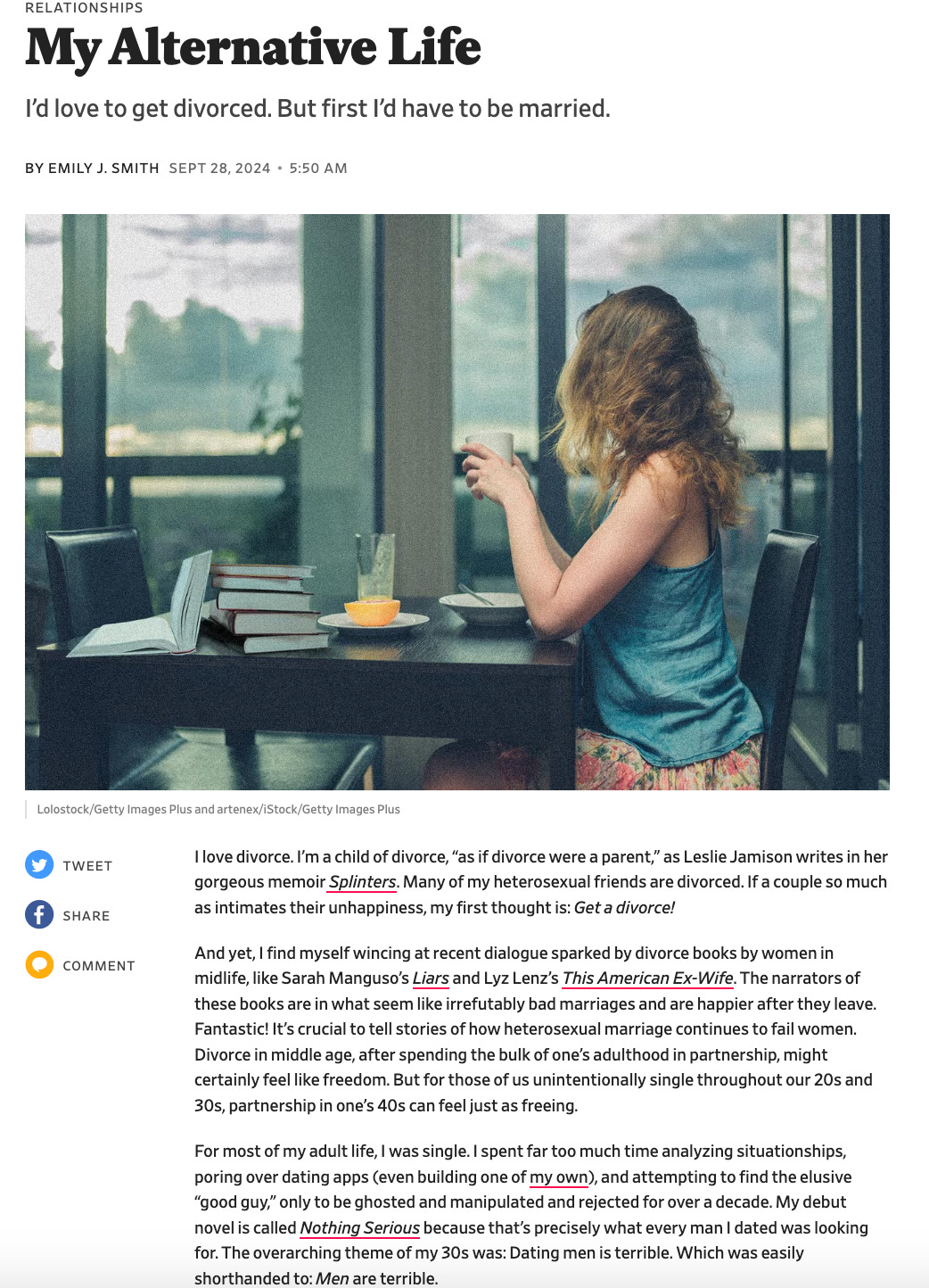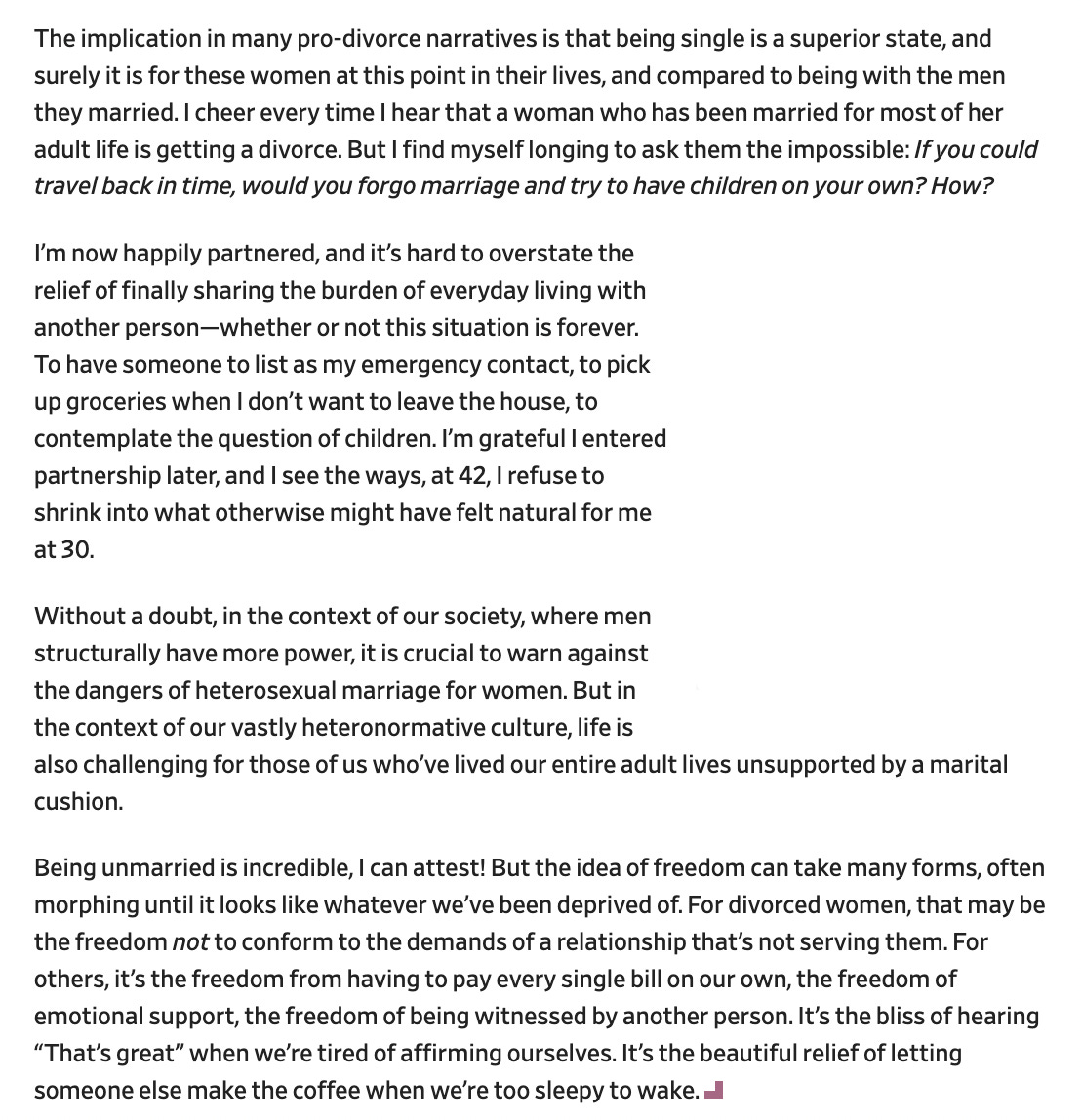This past weekend I published an essay with Slate, the result of something that’s been scratching at me for a while. If you’re in the literary world in any way—writer, reader, whatever—you may have noticed there’s been a lot of recent writing about divorce. Which, obviously, is great. We need more narratives about women freeing themselves from bad marriages, pushing through the fear inherent in change, especially when that change moves against a patriarchal norm, then coming out OK—more than OK, better for it. Yes!
The part that left me wanting a tad more commentary, though, was how some of the dialogue around these narratives resulted in a kind of over-simplification and arguable misrepresentation of what it means to be single. As someone who’s spent almost the entirety of my 20s and 30s alone while everyone around me “settled down,” I felt an urge to acknowledge the difference between that version of single life and newly divorced women who chose singleness in middle age after children and marriage and years of heterosexual partnership. Single life, for many divorced women, often looks like freedom. But for those of us who have been single forever, partnership can be just as freeing.
I was nervous to write this piece because it threads many fine lines, leaving me to wonder—why am I writing this at all? Who actually cares? There are so many other wildly more important things going on in the world. But this thought, while completely reasonable, is the death of writing. When I first started writing, my workshop teacher asked what got in the way of everyone’s writing. Most people in the class said “time,” or “focus,” or other practical obstacles. Mine was shame. I felt mortified to write my dumb little thoughts. It felt clear that nothing I wanted to write actually mattered.
The teacher, Chloe Caldwell, who now (nine years later) is one of my closest friends, replied without hesitation. Something like, “If it matters to you, there will always be someone else out there who it will matter to.” She helped me understand that writing is about demonstrating the stakes of anything—everything—the little and the big. The subject doesn’t have to be “major,” all that matters is how you write about it. Any material can be elevated, and if done well enough, there will always be at least someone out there who gets it.

The best part of publishing an essay is finding the other people who get what you’re trying to convey. I don’t think coupled people always realize how challenging it can be to perpetually be on your own without the cushions of partnership. It’s a bit passé to complain about not being in a relationship, as if by admitting what is a completely human desire, we’re admitting weakness. It felt good to voice the details of a single life—the financial and emotional costs—and hear from the people who understood.
This essay went through many revisions before publishing. I cannot imagine how anyone writes without friends (I’ll do a post on this and tips on how to make “writer-friends” soon bc the importance really can’t be overstated). Big thanks to
who, like so many times before, was in the trenches of the G-doc with me. And to the crew of women writer friends (mostly divorced) who sipped wine while I griped yet again about how “newly divorced women celebrating single-life don’t understand what it actually means to be single-single.” A vast oversimplification (read: rant), hence the many revisions, but I went on long enough that they all insisted I write the essay.Through the revisions, I was able to get at the heart of what had been irking me, strip away my impassioned frustration and articulate what I most wanted to convey. It still amazes me, the process of cracking an essay. My background is in engineering, so, to me, it’s almost like solving a math problem or getting a computer program to run smoothly—eventually, almost miraculously, it finally works. But it takes a lot of time, at lest for me, to slow my thoughts, untangle the mess, and get all the pieces in place.
You can read the full essay here.




Loved this on many levels. As someone in the happily-divorced camp, I didn’t miss the particular person but I did miss the safety net marriage provides (the emergency contact, the standing invite to dinners). But the thing I most needed to hear today was this: Something like, “If it matters to you, there will always be someone else out there who it will matter to.” Thanks! Looking forward to the how-to-make-writer-friends post.
"But the idea of freedom can take many forms, often morphing until it looks like whatever we've been deprived of." GOLD. I can't wait to read the full essay. I'm so glad you decided to wrestle with this one. I agree, when you crack it, you KNOW.